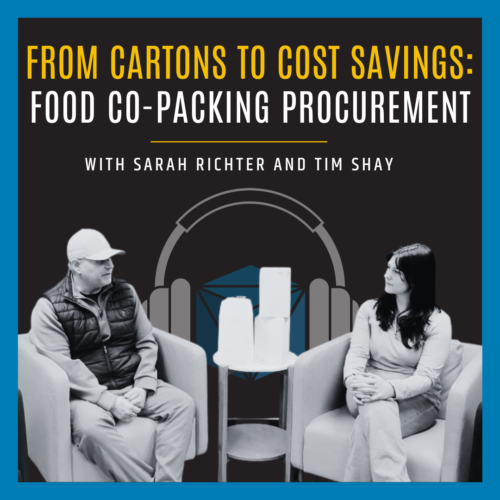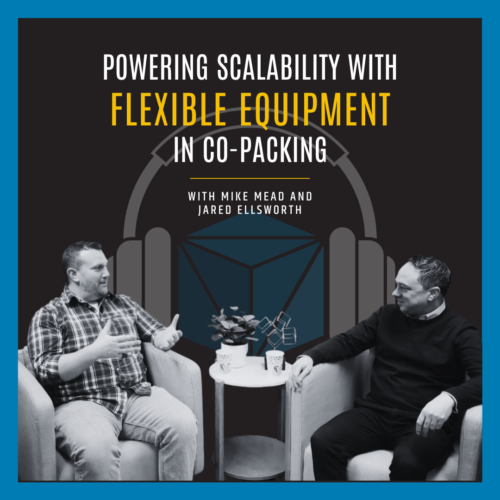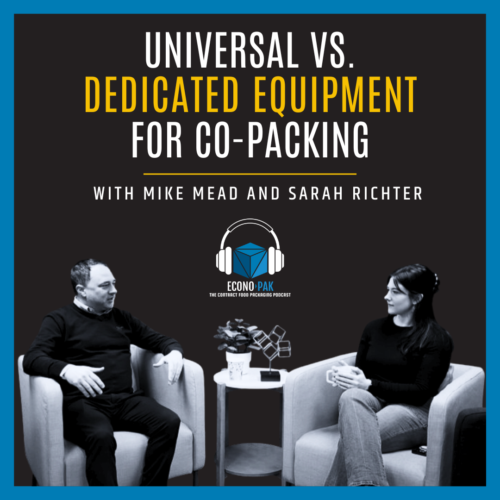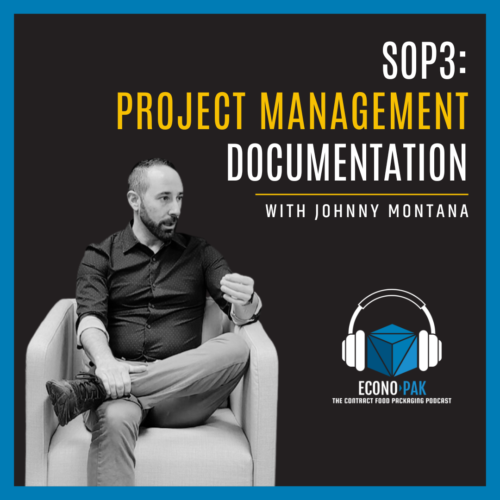How Strategic Planning and Culture Drive Success with CFO John Mellage
John Mellage, CFO of Econo-Pak, shares his journey from public accounting to managing finances at a family-owned co-packing company.
He highlights how Econo-Pak’s collaborative culture, strategic planning, and fixed-cost pricing model contribute to long-term client success and business growth in the co-packing industry.
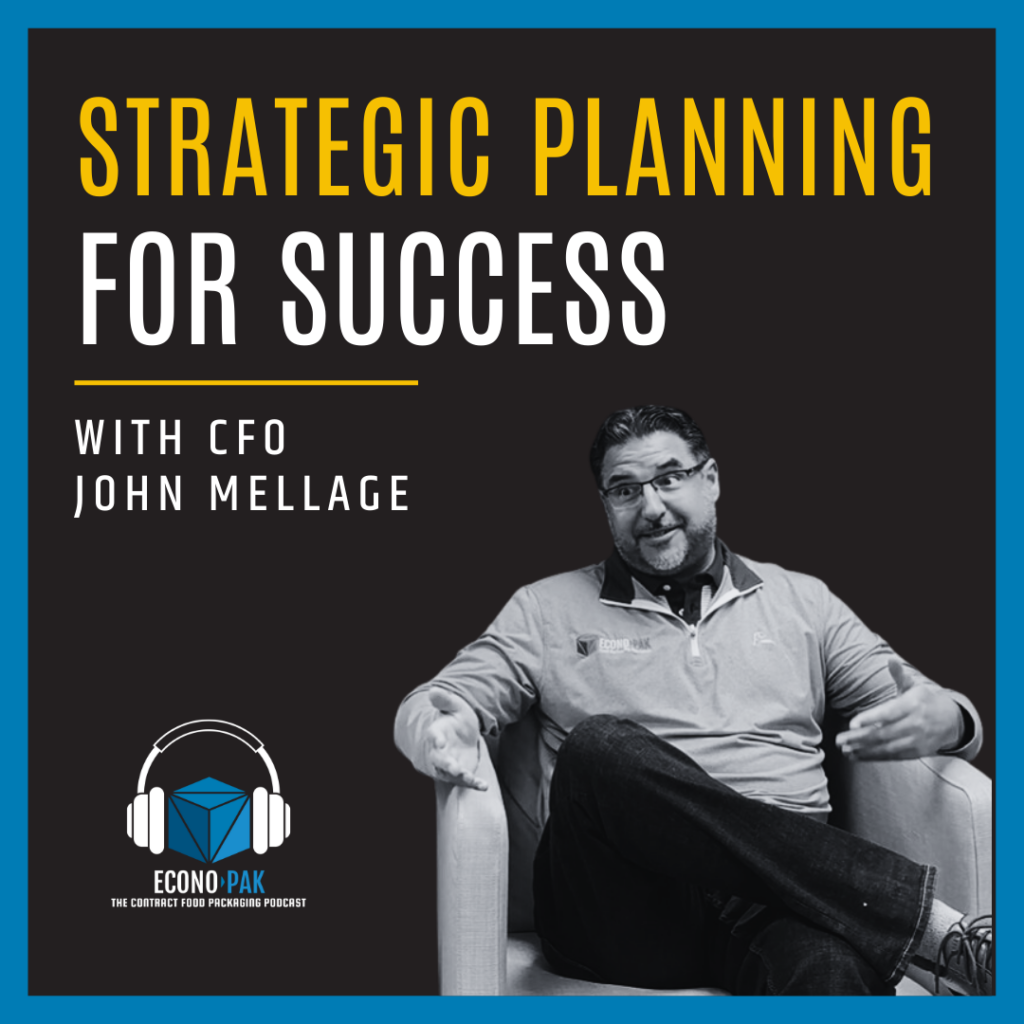
Transition from public accounting to Econo-Pak
Sarah Richter:
Thank you so much for joining us today, John. John is our CFO. So maybe you could talk a little bit about your experience here at Econo-Pak.
John Mellage:
Yeah, sure. I was in public accounting for my entire career over 25 years, so I actually used to come out and audit companies similar to Econo-Pak family-owned businesses or privately held businesses. I started my career off doing that and learning the ins and outs of how companies work and working with owners and all the staff members and things like that. So a lot of people come out into public accounting, and they go into work for publicly traded companies, large billion-dollar companies. That kind of wasn’t really what I knew I wanted to work with. I wanted to work with a small, family-owned type company. I wanted to kind of not say that you can’t make a difference in public accounting, but I knew I wanted to kind of directly work with owners and high-end personnel and see how it works and learn all about their staff and how their business operates.
So I worked with that for many, many, many years, and actually last year I got an opportunity; I knew this company, I knew the family very well, I knew the dynamics, and I knew what a successful company they were, and I kind of made a career decision after meeting with the family and having some discussions that this might be the right direction for me. I’ve always loved working outside, on the other side of it, in the auditing side and tax side. So coming in and joining the team with having that opportunity, I just thought, “This is probably a right time in my career, with my family situation,” and knowing where this company was going. I was just really excited, and I just seized that opportunity that I could take it at that point. So, yeah.
What stood out about Econo-Pak?
Mike Mead:
That’s great. Was there anything specifically that stood out to you with regards to joining Econo-Pak?
John Mellage:
Yeah, there’s actually a few things. So I think it’s the people, number one; you come here, I came here, I did an interview. I did a walkthrough of the entire factory. I’ve worked in so many different manufacturing distribution companies. I’ve worked in construction; I’ve worked in not-for-profits. And what I found, what makes a company successful is the energy that you kind of see with the people and what they have. And it’s, again, early on I learned, and you see this repeatedly, because I audited many, many, many different companies, is the similarities of what successful companies have.
And that’s really the tone at the top, and it funnels down all the way from the CEO or the president, all the way down to the line workers, and everywhere in between. And I think just watching people interact and looking on the floor and seeing how clean and amazingly efficient it looked on the floor, and seeing the people and the dynamics they work with company and the office personnel and things like that, that really was a big selling point for me because I really knew that there was honesty behind all the attitude that was here.
And you could see that in the dynamics of the people that are working and they were being treated well, they’re very good, they’re very happy. And it really helped me learn what a great place this was. And everybody was very forward and honest and have always positive attitudes. There’s always down times in companies, but maintaining that positivity and things like that are very important, and it sets the tone for the company, and you could see that through all the workers and things. So I saw that dynamic immediately. It’s something you can’t see on paper or do over a Zoom call.
Experiencing the culture firsthand
Mike Mead:
Yeah.
John Mellage:
You have to kind of be here to understand it and to see it work. And I know, having that experience of seeing what successful companies are like and what unsuccessful companies are like, or hardworking environments or maybe not as good a working environments, I knew that this was a place that I could fit in very easily and I’d be happy to be.
Mike Mead:
Yeah, that’s really cool.
John Mellage:
That was a big standout. Yeah.
Mike Mead:
Yeah, I can imagine. Yeah, because, like you said, you’re doing a lot of… Your due diligence is looking at the numbers and looking at the historical financials and things like that at your level as a CFO. So to actually come here and be attracted to the environment itself, I think that really speaks volumes to what we do here. That’s the way I felt when I joined the company as well.
Validating Econo-Pak’s success
John Mellage:
Yeah, it really was… And ever since I’ve been here, it’s stood by, right? So all of those things have been validated, right? So the more I come in here and the more I look at the finance side of things and the dynamics of the working groups and the teams and the meetings and the projects, and a lot of things are not taken for granted here. There’s a lot of planning that goes into everything. And I think that’s really what makes things successful is the planning and managing expectations.
And the more you stay in communication with everybody, including all the teams; none of us work in silos, I can tell you that here. And you probably know.
Mike Mead:
Oh, yeah.
John Mellage:
We all work very organically and fluidly. Everybody’s door is open at all times, and we share everything on a constant basis. So that really makes it a great planning tool in just a sense of general dynamics. We also do a lot of budgeting together in all the departments. And if there’s anything that comes up, people are very free to share, “Hey, this is what’s coming up, or we got a new client, or we got a new customer.” Just as you, Mike, have constantly come and see me on a regular basis.
Growing clients with strategic partnerships
Mike Mead:
One of the things that stood out to me, John, when I joined the company was looking at our current client and current customer and partners that we work with and seeing how they’ve been able to successfully grow with us. So they started off with maybe one or two smaller projects, and then looking at how long they’ve been working with us and continuing to add new programs and new projects and new skews, and just seeing that they trusted us in helping them grow and then watching those clients grow. I’m sure you noticed that when you were looking into the company as well.
John Mellage:
Absolutely. One of the things you look at is, you kind of do an analysis of the inner workings of a company, and part of that is customers and where you’re going and your growth. And one of those things is looking at that process. And ever since being here, we look at the largest clients, and we know that those clients have been here because of not just execution and doing what we need to do and what they need us to do, but also with the relationships that we’ve built internally with our teams and externally with those customers.
And we’ve leveraged that whole model. And again, coming in and seeing that from the sales side and the marketing side, from what you guys work on, you’ve been able to leverage those models and bring in your outside understandings to look at new customers. And we always have that conversation of, “Okay, we have a new customer that we’re looking at; how should we approach this? What do you need, John, from us?” And that’s always an important thing. And we do the back end of due diligence on, “Okay, what is this company made of?” Looking at D&B reports. Also, just looking at history of the company, doing some research, and understanding what their needs are short-term versus long-term, and hopefully joining them and extending them some credit if needed, and then growing that relationship into something that’s more successful. And that’s kind of been our model; it seems that I’ve noticed for ever since I’ve been here. And the great thing is that it’s been a perpetual process of getting new clients, so that’s always a good thing.
The importance of client relationships
Mike Mead:
Oh, yeah.
John Mellage:
But it’s not always easy. And I know that from the perspective of sales and marketing, and I’m looking at the internals and the dollars, but part of that also is not just looking at the dollars and cents. I can give you the numbers from what we’re making and what we’re doing, but there are relationships and things that kind of get built as time goes on. So you might not see those efficiencies or major profit margins in the beginning, but there’s a long-term plan, and there’s a lot more behind that that can lead to more work.
Helping clients scale with Econo-Pak
Mike Mead:
Absolutely. I see… One of the things that stands out to me in this industry as a whole is it starts off with us just helping a lot of clients fix a problem, become a solution for them because maybe they need a repack or they need a rework or they need help. Maybe they landed a new client, a new opportunity, a retail opportunity that they just don’t have the capability of getting to that scale.
So they reach out to companies, co-packers, and co-manufacturers like us. And I think people look at it as a way to help them get to that next level. And then what I see with us is that we create strategic partnerships, like you mentioned, right? We find ways to help them procure materials, we find ways to extend them credit and help them continue to grow, and we invest in the best equipment, create the best efficiencies, build programs specifically for their projects to make it very successful. And a lot of that is the planning, like you said at the top, and then being able to bring that process and procedure all the way through. And that’s what really stands out to me. And I, at first, didn’t understand that fully with the industry, with the co-packing and co-manufacturing industry, but now that I am in it, I’m like, “Wow, it’s very impressive what we do,” and I think it really stands out.
The power of a fixed-cost pricing model
John Mellage:
Yeah, I absolutely agree. And seeing it not from the back end from accounting but also being able to go on the floor myself and seeing how this process is working in our inventory, in our production equipment, and knowing that we have a handle on how much we’re producing on a regular basis, how much labor costs we’re using in a real-time basis.
Mike Mead:
Yeah.
John Mellage:
And that fixed cost model and fixed pricing model with our customers is a huge benefit to them because they know what they’re going to be paying and they’re not going to have full of surprises.
Mike Mead:
Yeah.
John Mellage:
And we kind of work on the back end on the efficiencies and things like that, knowing what our expertise are, so.
Mike Mead:
Yeah, it becomes very attractive, that fixed cost model for sure.
John Mellage:
It’s a huge plus.
Mike Mead:
Once our clients get familiarized with it and comfortable with it, there’s really no turning back.
Closing thoughts
John Mellage:
That’s correct. Yeah, so.
Mike Mead:
Great, yeah.
Sarah Richter:
Awesome. Well, it’s fascinating to hear your perspective on the company, especially at your level, so thank you so much for joining us today.
John Mellage:
Yeah, I love it.
Mike Mead:
Thank you, John.
John Mellage:
And it’s wonderful being here, so.
Mike Mead:
Appreciate it. Thank you.
John Mellage:
Thank you.
Let's start scaling.
Is your demand outpacing your ability to package your own product? Then consider outsourcing with Econo-Pak.
With over 40 years of experience working with both small brands and Fortune 500 companies, we are capable of handling your specific dry food product.
Get in touch with our team for a fixed-price quote for your project.

